 |
 |
|
 |
 |
|
|
Lecture given at the International Historical-Theological Conference at
Tsarskoye Selo, 16-17 July 1999
|
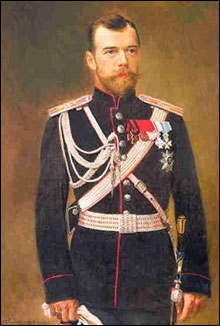
The Sovereign Nicholas II |
The book was brought a year ago into the church of the holy Prince Alexander Nevsky, which is in Pskov. Who brought it in – remained unknown. A white cross on the top cover of the book, which was bound in black. For 80 years this book was kept hidden and now, apparently, it was deemed by God to be time for this sacred object to come to light, to be granted to us at this very moment, in order that we come to realize the reasons for our endless Russian tribulations.
This book of the Old Testament belonged to the last Emperor of the Russian Empire, the Tsar-Martyr Nicholas Aleksandrovich Romanov, and was taken from a coach of the Imperial train in March 1917 at the train station in the city of Pskov, in the tragic days of Russia’s abdication from its Sovereign.
During those days Nicholas II was reading that book, and traces of his pencil are on the pages, while on pages 220 and 237 there are brief handwritten notes, made by the Tsar with the same pencil.
|
|
Prior to the appearance of this book, the external circumstances of the Emperor’s so-called abdication were known by the hour and often by the minute; they were interpreted and reinterpreted many times by participants in the event, with some seeking to justify themselves, others boasting of it, and still others claiming for themselves the role of objective chroniclers. Now we have found the most unbiased witness to the events of late February – early March 1917: a spiritual witness to what the Tsar was thinking in those hours, and how he came to his decision to leave the Russian throne. With the same pencil which he used to mark the lines of the Word of God in the Eternal Book, he signed the document that was greeted with mad clapping and insane joy on the part of Russia’s enemies, and was represented by them as the Tsar’s renunciation of Russia, while in reality it was Russia which renounced its Sovereign in those terrible hours. As of March 1917 this document is persistently presented as the Manifesto of Nicholas II’s abdication from the throne. An enormous falsehood in the history of Russia.
Apparently one must begin the countdown of events directly related to the Tsar’s abdication from February 14, 1917, when crowds of people, dissatisfied with the paucity of life in wartime, went out into the streets of St. Petersburg with the slogans “Down with the war!”, “Long live the republic!” On February 17 the strikes infected the large Putilov factory and spread like plague throughout the entire city. The workers ransacked the bread shops and beat up police officers. On February 23 there were already 128,000 people out striking. On February 26 the 4th company of the reserve battalion of the Pavlovsky Guards regiment, propagandized by the revolutionaries, rebelled and opened fire on the militia which tried to put down the disorders. The St. Petersburg garrison began to go over to the side of the crowds… By that time the whole of St. Petersburg was overwhelmed by workers’ demonstrations, demanding the bread that with criminal intent was not being delivered to the city, nor sold in the bread shops. The populace, egged on by a Masonic conspiracy, began to revolt. It was not enough for the Freemasons to have the National Duma in their hands – they aspired to take over all the power in Russia. Their only hindrance was the monarchy, and the Tsar was the obstacle which stood in their path.
Even prior to that time Tsar Nicholas Aleksandrovich could not be reproached for indecisiveness, but in those mutinous days the severity of his orders for the suppression of the traitorous revolt in the capital was truly dictatorial. In the evening of February 25 General Khabalov receives the Tsar’s order to immediately put down all the disturbances in the capital – the stirred up populace was engaged in ransacking and looting stores there, beating up and killing police officers. Then the Tsar sends General Ivanov’s corps from Headquarters to assist Khabalov. Believing even this to be insufficient, the Tsar travels by train to the commander of the Northern Front General Ruzsky, in order to send to St. Petersburg some of the troops brought in from the front. Without delay the Tsar signs a decree on the cessation of the work of the National Duma and the State Council for one month. The activity of the Duma blabbermouths is declared illegal. The Tsar’s design was to concentrate all the power in his own hands and the hands of his government, supported by the Army that was loyal to the Tsar.
But events develop contrary to the Tsar’s will. His orders are not followed. General Ivanov does not lead his corps into St. Petersburg. Soldiers from the St. Petersburg regiments refuse to obey General Khabalov. The Duma resists the Tsar’s decree, organizes an Interim Committee, and then, on the basis of it, an Interim Government… At that moment, were the Tsar to have just 300 soldiers loyal to him, to their oath, and to the law, and capable of fulfilling the Tsar’s iron will, Russia could have been detained at the edge of the abyss that had opened before it: the interim Duma committee could have been disbanded, and the councils of the “leech and flea” deputies (as they were called in those days) could have been executed. But in Pskov, however, the Tsar met not with loyalty to himself and to the oath of fealty on the part of the commander of the Northern Front General Ruzsky, but with… a demand for abdication. Aide-de-camp General Ruzsky (the highest rank of Marshal in the Imperial Army), fulfilling the role he had been assigned by the Interim Committee, suggested to Nicholas II to “surrender to the mercy of the victor.” General of the Imperial Suite Dubensky later reminisced: “The phrase ‘you must surrender to the mercy of the victor,’ said by Ruzsky with cynicism and harsh determination, undoubtedly indicated that not only the Duma and St. Petersburg, but also the members of the high command at the front were acting in full accord and had decided to implement a coup-d’etat.”
Not only the betrayal of Ruzsky, who two months later boasted in newspaper interviews of his “services to the revolution,” was so swift, but likewise that of the entire Army command. Here is the testimony of Ruzsky himself: “At about 10:00 in the morning I appeared before the Tsar with a report on my talks. Fearing that he would doubt my words, I invited my chief of staff General Danilov and chief of provision General Savich to come with me, in order to support me in my insistent advice to the Tsar to abdicate the Throne for the good of Russia and victory over the enemy. By that time I already had the responses of Grand Duke Nikolay Nikolayevich and Generals Alexeyev, Brusilov, and Evert, all of whom unanimously acknowledged the need for abdication.”
“I am surrounded by betrayal, cowardice, and lies,” – wrote the Tsar in his diary.
Some betrayed him deliberately – Alexeyev, Ruzsky, Brusilov, Kornilov, Danilov, Ivanov; others cowardly submitted to the traitors, though shedding tears of commiseration for the Emperor – his officers of the suite Grabbe, Naryshkin, Apraksin, Mordvinov; still others, forcing the Emperor to abdicate, lied to him that this was being done in favor of the Heir Apparent, while in reality they were striving to overthrow the monarchy in Russia. The ominous figures of the National Duma’s Interim Committee – Rodzianko, Guchkov, Milyukov, Kerensky, Shulgin – represented an ill-assorted and discordant pack of scoundrels and traitors to Russia, united in their malice towards the Russian Monarchy.
On March 1, 1917 the Tsar remained alone, practically imprisoned in the train, betrayed and abandoned by his subjects, separated from his family, who waited and prayed for him at Tsarskoye Selo. Being alone, Nikolay Aleksandrovich turns to the counsel and strength of the words of the Holy Scriptures, reads them, underlines chosen passages. The first thing that leaps to the eye from the Tsar’s markings in the Bible is the Emperor’s faith in God’s Providence, his conviction that the Lord is with him: “Fear not, for I am with thee” (Gen. 26:24), “Fear not, I am thy shield” (Gen. 15:1), “For the Lord thy God is a merciful God, He will not forsake thee, neither destroy thee” (Deuter. 4:31), “The Lord your God goeth before you, He shall fight for you” (Deuter. 1:30)…
|
|
Not a single name in the history of Russia has been so maligned as the name of the Tsar-Martyr and his holy Family. Mountains of lies must be toppled by anyone attempting to get to the truth about the abdication. But now we have a most truthful witness to the event, its causes and consequences – the words of the Holy Scriptures, underlined by the Emperor in accord with his thoughts, as the basis of his decision, and as confirmation of his foresight. No, this was not indecision or weakness on his part, of which the Emperor was accused so many times by idle unbelievers, nor was it an attempt to escape from applying harsh measures and to submit to fatalistic inevitability, since Orthodoxy denies the inevitability of God’s wrath and allows the possibility of live prayer transmuting God’s punishment of a sinful people. The Tsar takes this live prayer upon himself, because he is God’s Anointed – the one who transmits God’s will to his people and at the same time intercedes before God for his people. Here are the words he had highlighted: “The Lord, before Whom I walk” (Gen. 24:40), “Stand still, and I will hear what the Lord will command concerning you” (Num. 9:8), “And what are we, that ye murmur against us? Your murmurings are not against us, but against the Lord” (Exodus 16:7-8).
|
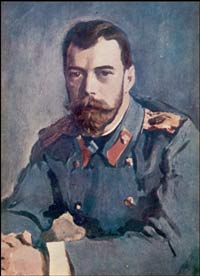
Tsar Nicholas Aleksandrovich |
|
The Tsar sees the lofty purpose and burden of his service in the following words: “Be thou a mediator from thy people towards God, that thou mayest bring their causes unto God” (Exodus 18:19), “Teach them ordinances and laws, show them the way wherein they must walk, and the work that they must do” (Exodus 18:20). And here he marks in the Bible another condition of his service, whose fulfillment does not depend on him alone: “Thou shalt provide out of all the people able men, such as fear God, men of truth, hating covetousness, and place such over them, to be rulers of thousands, and rulers of hundreds, rules of fifties, and rulers of tens. And let them judge the people at all seasons: and it shall be, that every great matter they shall bring unto thee, but every small matter they shall judge: so shall it be easier for thyself, and they bear the burden with thee. If thou shalt do this thing, and God command thee so, then thou shalt be able to endure, and all this people shall also go to their place in peace” (Exodus 18:21-23).
But there were no such men to be found nearby – fearing God, loving truth, hating covetousness, loyal to their oath. All of them showed themselves to be traitors – from the common servicemen of the St. Petersburg reserve regiments to the commanders-in-chief of the fronts, to the closest relatives, the grand dukes. No one wanted to bear the burden with him. General Ruzsky advised – whom?! his Sovereign! – to “surrender to the mercy of the victor.” What “victor”? A handful of mutinous rabble egged on by the Jews, and its “councils” headed by Tsederbaum, Dan, Axelrod…? The Masonic Interim Committee, whose illegality was acknowledged even by a member of this committee, Milyukov: “I am being asked – who elected all of you? No one elected us, for if we were to wait for popular elections, we would be unable to seize power from the hands of the enemy…”? Which enemy, who is an enemy to the Freemason Milyukov? It is God’s anointed one, the Russian Tsar! General Alexeyev, to whom the Tsar had entrusted the Headquarters and leadership over all military actions, “insistently advises abdication” and obtains the support of similar “recommendations” from all the commanders of the fronts. The Grand Duke Nicholas Nikolayevich sends the Tsar the “plea of a loyal subject,” demanding his abdication, and shamefully hurries to report this in an ingratiating telegram to the Chairman of the Duma Rodzianko: “At this moment, in accord with the opinion of aide-de-camp General Alexeyev, I have presented to the Emperor the plea of a loyal subject – for the sake of Russia’s salvation and to put a triumphant end to the war, to come to the decision that we believe to be our only way out in the existing fatal circumstances. Commander-in-chief of the Caucasian Army, aide-de-camp General Nicholas.”
There were no other people near the Tsar who were loyal to Russia – some died, others had been killed: Pobedonostsev, Stolypin, Trepov, Pleve….Only the traitors were left. Grand Duke Vladimir Kirillovich, arriving at the Duma with a red ribbon on his chest, placed the Naval Guards who had been entrusted to him by the Emperor at the full disposal of the “new government.” The Grand Dukes Alexander Mikhaylovich, Boris Vladimirovich, Serge Mikhaylovich, Dmitry Konstantinovich, Nicholas Konstantinovich, Gabriel Konstantinovich, and Igor Konstantinovich likewise did not delay in swearing an oath to the Interim Government. Even the Tsar’s guard, His Majesty’s personal Convoy, who had remained in St. Petersburg, announced to the National Duma its rejection of the Tsar. An eyewitness described the arrival of the Emperor’s train at Tsarskoye Selo: “There were many members of the Tsar’s retinue traveling with him in the train. When the Tsar came out of the coach, these individuals poured out unto the platform and began to flee in various directions, looking all around them… I well remember how Major General Naryshkin, who was, by the way, a close childhood friend of the Tsar, was running away in precisely such a manner.”
In the lines of the Holy Scriptures, marked by the fine point of the Emperor’s pencil, we can clearly read the search for an answer to the question which tormented Nicholas Aleksandrovich at that time, as to what had happened to his people, who had so quickly betrayed their natural Tsar: “What shall I do unto this people? They be almost ready to stone me” (Exodus 17:4). “Wherefore hast Thou afflicted Thy servant? And wherefore have I not found favour in Thy sight, that Thou layest the burden of all this people upon me? Have I conceived all this people? Have I begotten them, that Thou shouldest say unto me: carry them in thy bosom, as a nurse beareth a child?...I am not able to bear all this people alone, because it is too heavy for me” (Num. 11:11-14).
The burden of intercession for a traitorous people, a mutinous people, a people who demanded to replace the kingdom with a republic, – was truly an unendurable and futile yoke, but the Tsar does not reject his people. The Tsar’s pencil decisively underlines the following words in the Bible: “Yet now, wilt Thou forgive their sin? And if not, blot me, I pray Thee, out of Thy book which Thou hast written” (Exodus 32:32).
How these lines coincide with the well-known vision of Metropolitan Macarius of Moscow: “Soon I fell asleep again and saw myself standing in the same arch, and behind it with the Saviour stood Tsar Nicholas Aleksandrovich. The Saviour said to the Tsar: You see in My hands two cups – one which is bitter for your people, and the other sweet for you. The Tsar fell to his knees and for a long time begged the Lord to allow him to drink the bitter cup in place of his people. For a long time the Lord did not agree, but the Tsar begged importunately. Then the Saviour drew out of the bitter cup a large glowing coal and laid it in the palm of the Tsar’s hand. The Tsar began to move the coal from hand to hand, and at the same time his body began to grow light, until it had become completely bright, like some radiant spirit… Falling asleep yet again, I saw an immense field covered with flowers. In the middle of the field stood the Tsar, surrounded by a multitude of people, and with his hands he was distributing manna to them. An invisible voice said at this moment: ‘The Tsar has taken the guilt of the Russian people upon himself, and the Russian people is forgiven’.” The Tsar truly said in those days, and it has been recorded in the written testimonies of eyewitnesses: “Perhaps a sacrifice of atonement is needed for the salvation of Russia; I will be that sacrifice, – may God’s will be done!”
The thought of atoning for the sins of the people who had dared destroy the Kingdom does not leave the Tsar even in the Pskov train. In the Holy Scriptures he sees a solution and underlines it: “There is wrath gone out from the Lord; the plague is begun…” Then the high priest “made an atonement for the people. And he stood between the dead and the living, and the plague was stayed” (Num. 16:46, 48).
Such is the outcome of Emperor Nicholas Aleksandrovich’s decision “to stand between the dead and the living” – those who were already dead, having rejected God and His anointed one, and those who remained loyal to the Tsar, but procrastinated in idleness or remained unaware of the forthcoming danger. The danger of everyone’s destruction was more real than ever. We, Russians, are bound to the end of our days by the decree issued at the All-Russia Council of 1613, bound by the Russian people’s oath of eternal fealty to the royal Romanov dynasty, an oath sworn by our ancestors for themselves and for us, their descendants. A violation of the council decree by no matter whom – be it the Tsar or the people – leads with fatal inevitability to countless tribulations for the Russian people and its Kingdom. This is where the end awaited us, this is when Russia and the Russians were close to perdition.
|
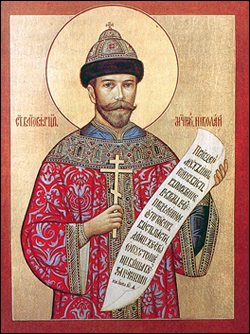 Tsar-Martyr Nicholas
Tsar-Martyr Nicholas
|
The desire to “stand between the dead and the living” and to save the Russian people followed the Tsar’s each step at the train station in Pskov with the symbolic name “Dno” (Bottom). The Tsar does not act with confusion, nor with hesitation, nor rushing from side to side as a cornered animal, seeing himself surrounded by the red flags of the revolution. On the contrary, he acts calmly and resolutely, in accordance with the words of the Old Testament. Even his enemies and the apostates noted with amazement during those days that the Tsar was exceptionally calm. He was calm because he knew what he was doing, because he was convinced of the rightness of the duty he was fulfilling, because his each step was confirmed by the Holy Scriptures. For him the most important thing was to leave without having his departure turn into ruin for the people.
|
|
Let us reproduce from the memoirs of one of the primary players in the tragedy, General Ruzsky, the sequence of events in the appearance of the document which to this day is being falsely labeled as the Manifesto of Abdication. On March 1, 1917, “at about 3:00 the Tsar invited me in and declared that he had already signed the Act of Abdication, and that he had abdicated in favor of his Son. He then handed over to me a signed telegram of abdication.” Here is its text: “In these troubled times of severe trials for Russia we, not having the strength to lead the Empire out of the great upheaval being experienced by the country in the face of the external enemy, have deemed it to be proper, in view of the wish of the Russian people, to relinquish the reins of power that had been handed to us by God.
For the sake of the dignity of our beloved Russian people and victory over the fierce enemy, we summon God’s blessing upon our Son, in whose favor we abdicate our Throne. Until his majority our Brother, Michael Aleksandrovich, is to be his regent…”
That night the Tsar remembered the holy sacrifice of the Forefather Abraham, who out of love for God did not spare even his only-begotten son. This is seen from the phrases that were underlined by Nicholas Aleksandrovich in the Scriptures: “And they came to the place which God had told him of; and Abraham built an altar there… and bound Isaac his son, and laid him on the altar.” And God said to Abraham: “Now I know that thou fearest God, seeing thou hast not withheld thy son, thine only son from Me” (Gen. 22: 9, 12).
Let us again turn to Ruzsky’s memoirs: “Back at headquarters I was handed a telegram signed by Guchkov and Shul’gin, notifying me that they had left for Pskov at 3:35. After receiving this telegram, I refrained from publicizing the Manifesto of Abdication… I was in my coach when the commissars arrived… When I entered the Tsar’s coach, A.I. Guchkov was giving him a detailed report on the latest events.
|
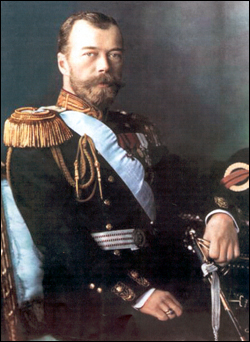 Tsar Nicholas II
Tsar Nicholas II
|
Nicholas II was particularly thunderstruck by the news that His personal Convoy went over to the side of the rebelling troops. This fact so stunned him, that he listened to the rest of Guchkov’s report inattentively. To the Tsar’s question as to what he should do, Guchkov replied in a tone brooking no argument: ‘You must abdicate the Throne.’ The Tsar calmly listened to this declaration on the part of the commissar of the executive committee. After a long pause he said: ‘Very well, I have already signed an act of abdication in favor of my Son, but now I have come to the conclusion that my Son’s health is not too strong, and I do not wish to part from him; therefore, I have decided to cede the Throne to Michael Aleksandrovich.’ The commissars did not object. The Tsar went into the coach next door together with Fredericks, composed a new text of abdication, and returned to the coach in which the commissars sat. For ten minutes there was an onerous silence. Finally Fredericks reappeared with the typed act of abdication, which the Tsar signed right on the spot.”
|
|
Thus appeared the document which the conspirators named the “Manifesto of Abdication,” and in the March newspapers of 1917 it was published with a false heading – “Manifesto. We, Nicholas the Second by the grace of God…,” as was customary in genuine Imperial Manifestos. In reality it was only a telegram from the Tsar to Headquarters, to staff commander Alexeyev:
“Headquarters. To the Staff Commander.
In the days of the great struggle against the external enemy, who for almost three years has been striving to enslave our Homeland, the Lord God deemed it necessary to send Russia a new and severe trial. The incipient internal uprising of the populace threatens to impact disastrously upon the further progression of the relentless war. The fate of Russia, the honor of our heroic army, the good of the people, the entire future of our precious Fatherland demand the bringing of the war to a victorious end at all cost. The cruel enemy is engaging in a last-ditch effort, and the hour is near when our valiant army, together with our honorable allies, will be able to crush the enemy totally. In these decisive days in the life of Russia, WE have deemed it OUR duty to facilitate for OUR people a close unity and alliance of all popular forces for the quickest attainment of victory, and, in agreement with the National Duma, WE have deemed it proper to abdicate the Throne of the Russian State and relinquish the reins of Supreme Power. Not wishing to part from OUR beloved Son, We pass OUR legacy to OUR Brother, the Grand Duke Michael Aleksandrovich, and bless His mounting upon the Throne of Russia. We exhort OUR Brother to rule over state affairs in full and inviolable unity with the representatives of the people in legislative institutions, on the principles that will be established by them, swearing to it with an inviolable oath. In the name of OUR ardently beloved Homeland, WE summon all loyal sons of the Fatherland to fulfill their holy duty to it by obeying the Tsar in the difficult moment of universal trials, and to help Him, together with the representatives of the people, establish the Russian State upon a path of victory, prosperity, and glory. May the Lord God help Russia.
Pskov, March 2, 1917, 15:00.
Nicholas.”
|
|
Was this document a Manifesto of the Tsar’s abdication of the Throne? No, it was not. First of all, because this document was deliberately composed by the Tsar in violation of the law. Nicholas Aleksandrovich could not, had no right to hand over the monarchic power to his brother in the presence of a living heir. The fact that such an abdication was unlawful was already apparent at that time to all those who surrounded the Tsar, both the intentional traitors and their cowardly fellow-travelers. There is no provision at all in the law of succession for the abdication of a Tsar. In accordance with other laws of the Russian Empire, a guardian – and the Tsar had precisely that status in regard to his son – could not renounce an heir’s rights on behalf of that heir before the latter attained his majority. Staff Colonel Mordvinov writes in his memoirs about the obvious illegality of passing on the power to Michael Aleksandrovich: “They are in doubt whether the Tsar has the right to hand the Throne over to Michael Aleksandrovich, bypassing the Heir Apparent, and they are checking the fundamental laws.
|
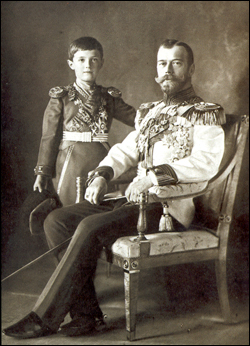
The Tsar and his Heir |
|
I already know in advance that logically it is hardly likely that they would contradict the general laws, according to which a guardian cannot renounce any of his prot?g?’s rights, which means that until Alexis Nikolayevich attains his majority, the Tsar cannot hand the Throne over, neither to Michael Aleksandrovich, nor to anyone else. We swore an oath of fealty to the Sovereign and to his legal Heir, and as long as Alexis Nikolayevich is alive, there is only one legal Heir.”
The Tsar’s telegram to Headquarters, falsely called the “Manifesto of Abdication,” was the Sovereign’s last appeal to the Army. This telegram made it clear to every honest and loyal officer that the Tsar was being constrained, that this was a coup-d’etat. This is precisely why the Tsar chose the format of a telegram to Headquarters, knowing that it would be immediately dispatched to the troops by the triumphant traitor-generals, but among the troops there were still commanders and soldiers who remained loyal to the Tsar, to their oath, to their fealty sworn on the cross.
It was precisely in such a manner – as a summons to action, to saving the Throne and Russia – that this telegram was understood by the commander of the 3rd Cavalry Corps, Lieutenant General Theodore Arturovich Keller. Gathering together representatives from each company and squadron of the units that had been entrusted to him, he said: “I have received a telegram about the Tsar’s abdication and about some kind of interim government. I, your old commander, who has shared with you deprivations, and sorrows, and joys, do not believe that at this moment in time our Sovereign Emperor could have voluntarily abandoned the Army and Russia. Here is the telegram that I have sent to the Tsar: ‘The 3rd Cavalry Corps does not believe that You, Tsar, have voluntarily abdicated the Throne. Command us, Tsar, and we will come and defend You’.” “Hurrah! Hurrah! – shouted the dragoons, the Cossacks, the hussars. – Let us all support Him! We will not allow the Emperor to be harmed!” Their enthusiasm was overwhelming. Everyone wanted to hurry to the rescue of the imprisoned Tsar. But Lieutenant General Keller was immediately relieved by Headquarters of his command of the corps.
Another honorable officer – the chief of staff of the detached Cavalry Guards Corps, Colonel A.G. Vikenen – sent a telegram to the Tsar on behalf of his then absent commander, Aide-de-camp General Khan-Nakhichevansky, which he had the right to do in extraordinary circumstances: “We have heard news of major events. I humbly ask Your Majesty to accept the boundless loyalty of the Cavalry Guards Corps and its readiness to die for its beloved Monarch. Aide-de-camp General Khan-Nakhichevansky.” When Vikenen reported this telegram to the Khan upon his return, the latter became so enraged that Vikenen understood everything, went to his quarters after finishing his report, and shot himself.
Thus, on March 2, 1917, the Tsar did not abdicate the Throne. First of all, he had no right to such an abdication, since it was a violation of the Conciliary decree of 1613 and of the law of succession. Secondly, the Tsar, though actually imprisoned by the conspirators in Pskov, by virtue of his royal service had no right to meekly submit to their force. And so to this end he composes an intentionally unlawful document and sends it out as a telegram to his entire army, giving his people and the troops and their commanders who swore fealty to him a last chance not to forswear their oath, and tries to prevent his people from breaking their oath, from violating the Conciliary oath of 1613. Nicholas Aleksandrovich deliberately composes the telegram in such a format, since Headquarters chief of staff, the traitor-general Alexeyev, would not have dispatched any other kind of telegram to the Army. This was the only document in the history of the Russian State which the Tsar signed with a pencil. With this same pencil he underlined in those difficult hours the following sacred lines: “Ye are risen up in your fathers’ stead, ye progeny of sinful men” (Num. 32:14); “Every imagination and thought of their hearts was continually only evil” (Gen. 6:5).
Tsar Nicholas Aleksandrovich’s last appeal to his Army on March 2, 1917 went unheard.
On March 3rd Grand Duke Michael Aleksandrovich sits down with the self-styled Interim Committee to discuss the conditions of his “abdication.” Having no legal rights to the Throne whatsoever, nor to the making of such decisions, he signs a “manifesto” composed for him by the Freemasons Nabokov, Milyukov, Guchkov, Kerensky: “Inspired by a single thought with all the people – that the good of our Homeland is above all – I have firmly resolved to accept supreme power only if such is the will of our great people, who should establish by means of universal voting and through their representatives in the constituent assembly, the form of rule and the new laws of the Russian State. Therefore, calling upon God’s blessing, I ask all citizens of the Russian nation to submit to the Interim Government that has been formed at the initiative of the National Duma and which is vested with full powers, until the time when the constituent assembly, convened in the quickest possible time on the basis of universal, direct, equal, and secret voting, by its decision concerning the form of rule expresses the will of the people.”
That same day the Tsar wrote in his diary: “It appears that Misha has abdicated. His manifesto has a four-tail ending for electing a constituent assembly in six months. God knows who advised him to sign such an abomination.”
Truly “one should not follow the majority, in order not to do evil.” In these words of the Holy Scriptures, underlined by the Tsar, he saw a warning concerning the danger of not following God, but the majority, since the latter engenders evil and perverts justice.
The universal, direct, equal, and secret voting, which the Tsar calls “a four-tail ending” in his diary, is a real “following of the majority,” which the Tsar strived to avoid. From the days of his youth he remembered the sad experience of his grandfather, Emperor Alexander II, who had tried to grant “the Constitution and elections” to his people. The noblemen, headed by Loris-Melikov, talked Alexander II into signing an Act on Russia’s stepping onto the Western European constitutional path, assuring the Emperor that this was the only way out for Russia’s salvation. The Act was signed in the morning of March 1, 1881. Then the Emperor rode out to the Armory, intending to quickly return to the palace and hand the signed Act over to the noblemen, led by Loris-Melikov. But the Lord decreed otherwise. On the way back from the Armory to the palace, the Tsar fell at the hands of a vile Socialist assassin.
Upon mounting the Throne, on the very first day of his reign Tsar Alexander III tore up Loris-Melikov’s constitutional act. In one of his last talks with his son, the then Heir Apparent Nicholas, Alexander III touched upon the martyric death of his late father and on his error in going against the Conciliary decree.
“Yet now, wilt Thou forgive their sin? And if not, blot me, I pray Thee, out of Thy book which Thou hast written…”
In the evening of March 3rd, after receiving the news of Michael Aleksandrovich’s “abdication,” the Emperor arrived at Headquarters in Mogilev and gave General Alexeyev a new telegram
“To the chairman of the National Duma. St. Petersburg.
There is no sacrifice that I would not make for the true good and salvation of our beloved Mother Russia. To this end I am ready to abdicate in favor of my Son, in order that he stay with us until his majority, under the regency of my brother, Grand Duke Michael Aleksandrovich. Nicholas.”
Here it is, this very document, never made public at that time, but it exists and attests to the fact that the Royal Monarchy remains unrevoked in Russia to this very day. The traitor Alexeyev did not send the telegram, “in order not to agitate the minds,” and did not show it to anyone, but carried it around in his wallet. Only in May of 1917, as he was leaving the supreme command of the Army, from which he had been dismissed by the Interim Government, he passed on this extraordinarily significant document to General Denikin, but even the latter, in view of his democratic convictions, did not pay due attention to the great words of the Tsar.
|
|
Thus, everything was finished. The arrested Sovereign was taken by train from Mogilev to Tsarskoye Selo, where General Kornilov had already arrived on assignment from the Interim Government to imprison the Tsar’s Family. And at that fatal hour it apparently did not come to anyone’s mind in Russia that the Tsar could be dismissed only together with the Lord, Whose grace rested upon him. But God is not to be mocked, and avenges Himself upon the disobedient people for the expulsion of His Anointed One. The Tsar was the only one to remember it, and he sorrowfully marked in the Holy Scriptures the prophetic words about Russia’s forthcoming punishment: “But if ye will not harken unto Me, and will not do all these commandments, and if ye shall despise My statutes, or if your soul abhor My judgments, so that ye will not do all My commandments, but that ye break My covenant, I also will do this unto you. I will appoint over you terror, consumption, and the burning ague, that shall consume the eyes and cause sorrow of heart… And ye shall be slain by your enemies… I will punish you sevenfold more for your sins, and I will break the pride of your power.
|
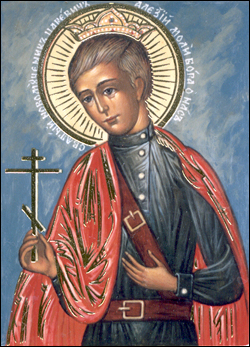
Tsarevich Alexis |
And your strength shall be spent in vain. And I will bring a sword upon you, that shall avenge the quarrel of My covenant. I will break the staff of your bread, and ye shall eat the flesh of your sons, and the flesh of your daughters shall ye eat. And I will destroy your high places, and cut down your images, and cast your carcasses upon the carcasses of your idols, and My soul shall abhor you. And I will make your cities waste, and bring your sanctuaries into desolation. And I will scatter you among the heathen, and will draw out a sword after you: and your land shall be desolate, and your cities waste… And upon them that are left alive of you I will send a faintness into their hearts…” (Lev. 26:14-36). “For it is a terrible thing that I will do with thee” (Exodus 34:10).
This entire prophecy soon came to pass. Defeat from the enemies in the First World war and during the years of the Civil War, the horror and burning of the typhoid epidemics and the plagues, widespread famine and cannibalism in the more starving provinces, the vengeful sword of repression and dispossession, the overthrow of the ideals of first the February democracy and then the October Bolshevism, the desecration of churches, the escheated towns and villages, the Russian emigration scattered all over the world, and for those who remained in Russia – deep-rooted and eternal fear, all the way up to today’s submission to the enemy…
It seems that everything there is in the prophecy has befallen us and has been sorrowfully fulfilled according to the following words underlined by the Tsar: “Then their heart failed them, and they were afraid, saying one to another: ‘What is this that God hath done unto us’?” (Gen. 42:28). But so far these words have not been heard in our society, and yet, according to the Holy Scriptures, our entire future fate depends on the moment when we say: “What is this that God hath done unto us?” “We saw the anguish of his soul, when he besought us, and we would not hear; therefore is this distress come upon us” (Gen. 42:21).
Of all those who were disloyal to the Tsar, who betrayed him, ran away in fear, kept silent, stayed away – all drank the cup of God’s retribution to the full. Already by 1918 there was no General Alexeyev, nor General Ruzsky, nor General Kornilov: cast off at first by the Interim Government, then by the Bolsheviks, they tried to organize a white resistance – but all in vain. As the Tsar underlined: “It shall not prosper. Go not up, for the Lord is not among you; that ye be not smitten before your enemies… Ye shall fall by the sword: because ye are turned away from the Lord, therefore the Lord will not be with you” (Num. 14:41-43).
|
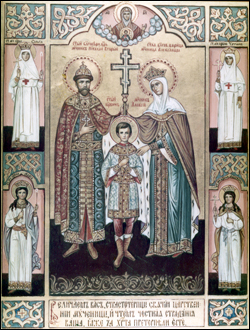
The Royal Martyrs |
General Ruzsky was hacked down by Red soldiers in Krasnodar; General Kornilov died a horrible death; General Alexeyev died of an illness, according to his comrades-in-arms, “tormented by pangs of conscience for his Judas’ sin.” The guchkovs and the kerenskys, after celebrating for eight brief months their victory over the monarchy, were exiled abroad and died in dishonor, while our land, having been given over into the hands of foreign enemies, remains in their hands to this day.
It anything could change our lot, it would be a realization of our collective guilt before the Tsar, our penitent prayer to God with a plea for forgiveness, our ardent desire to restore the Kingdom in Russia. This is what the Tsar prayed to God for in those terrible March days of 1917: “The Lord is longsuffering, and of great mercy, forgiving iniquity and transgression, and by no means clearing the guilty, visiting the iniquity of the fathers unto the children unto the third and fourth generation. Pardon the iniquity of this people according unto the greatness of Thy mercy” (Num. 14:18-19).
|
|
Tat’yana Mironova
Reprinted from “The Russian Herald,” ¹ 32-33, 1999.
|
|
|
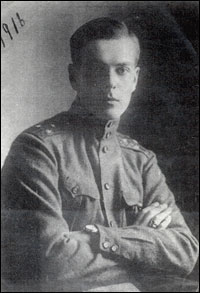
Prince Vladimir Paley |
THE PRISONER |
The night is mute and terrible. The time drags by.
And sleepless lies the prisoner with anguished soul
So overwhelmed by memories of bygone days
Spent in a far-away and kindly life…
Outside the window paces the incessant guard,
Not just a person set to watch another man,
Nay – he’s a Latvian, a sullen bloody foe,
Who treats the prisoner with cold and fierce contempt…
O why? O why? The thought erupts forth from the soul,
And all the torture of this mental anguish,
Of every hour of this fearful expectation,
Of murders menacing each quiet moment,
The prisoner’s thoughts will prayerfully raise on high…
All that oppresses is so gloomy and so base…
Those near and dear are all so terribly remote,
And yet his foes are all so terribly nearby.
|
|
- New Martyr Prince Vladimir Paley (1918)
|
|
|
 |